Editorial
Mr. President abort this racket!

Monday 28th November, 2022
Some racketeers are making the most of Sri Lanka’s foreign currency crunch to put through various crooked deals on the pretext of promoting foreign investment and rake in billions of dollars at the expense of hapless Sri Lankans struggling to keep the wolf from the door. They are eyeing the country’s mineral resources among other things.
In June 2022, we exposed a sinister move by a foreign company and its local agents to carry out an ilmenite racket at Aruwakkalu, Puttalam, and the then President Gotabaya Rajapaksa promptly intervened to stop it, but six months on, the racketeers have made a comeback. They are so influential that they have gained access to President Ranil Wickremesinghe himself, who, we believe, is not au fait with the project. We hasten to add that the President is not involved in this racket; he may be driven by a genuine desire to bring in much-needed foreign investment to straighten up the economy, but some of his advisors seem to have misled him. That may be the reason why he summoned the newly-appointed Cement Corporation Chairman Jagath Dharmapriya on Friday (25) and instructed the latter to ensure that the project at issue was implemented forthwith. Sadly, the legal principle, Audi alteram partem (‘listen to the other side’), often goes unheeded!
Let the President be informed that about one and a half years ago, Sri Lanka Mineral Sands Ltd., and Sri Lanka Cement Corporation planned to embark on a joint venture to extract ilmenite found in overburden red soil removed for limestone quarrying on a 5,352-acre state land at Aruwakkalu. The project was expected to yield a great deal of foreign exchange for the country, but the aforesaid foreign firm, backed by a bunch of corrupt government politicians and officials, derailed it in a bid to secure the contract for ilmenite extraction; the country will get nothing from this firm other than royalty paid to the Geological Survey and Mines Bureau, which is a den of thieves. The rogue company claims that it will invest a considerable amount of forex in the project, but it will bring in only machinery, which will be of no use to anyone in the end. Does the government want to swap ilmenite worth billions of dollars for a heap of scrap iron? The initial investment could be recovered in a few months, according to the project documents The Island has seen. No wonder some state officials and politicians are all out to have the contract awarded to the foreign firm!
The racketeers are so influential that they even had the then Cement Corporation Chairman Gamini Ekanayake, who together with some courageous state officials vehemently opposed the corrupt deal, removed from his post. But his successor Dharmapriya has proved to be equally intrepid; he too has chosen to protect the interests of the country by opposing the shady deal on the drawing board. He deserves praise. The country needs such upright officials.
Geologists inform us that what has surfaced with top soil at Aruwakkalu is only a fraction of a huge ilmenite deposit lying underneath. Sri Lanka will gain tremendously if it can export ilmenite as a value-added product. At present, a metric ton of ilmenite without value addition fetches about USD 300 in the international market, but its price will increase to about USD 2,200 if it is exported after being processed. What prevents value addition, which consists of several phases, and is very expensive, is that not enough ilmenite is excavated in the country at present to attract a foreign investor. Experts are of the view that the shortfall could easily be met with ilmenite found at Aruwakkalu for an investor to be invited in a transparent manner. The racketeers are striving to obtain ilmenite for a song with the help of corrupt politicians and officials here and make huge profits at the expense of the country.
The racket is being carried out at the behest of an ‘educated’ politician, who pontificates ad nauseam about the virtues of good governance and pretends to be a paragon of virtue. We will name him in this column when our legal team permits us to do so. We have no civil word to say about State Minister of Primary Industries Chamara Sampath Dissanayake but, credit where it is due, he has refused to help the racketeers. Thus, it should be clear that education alone does not make a good minister.
President Wickremesinghe may not be popular but he is widely considered an intelligent leader, and one can only hope that he will ensure that the country—and not a bunch of crooked individuals including some government politicians—will gain from the exploitation of ilmenite at Aruwakkalu. We wish to draw his attention to the historic Supreme Court judgment (2000) in Bulankulama and Others v. Secretary, Ministry of Industrial Development and Others—or the Eppawala case as it is better known; it specifies how to manage the country’s mineral resources for the benefit of the present-day Sri Lankans and generations to come.
We suggest that an expert committee be appointed to study the issue at hand. It should comprise officials from the Treasury and relevant ministries, the Land Commissioner, independent experts in the fields of geology, mining and economics, environmentalists, and representatives of the Attorney General’s Department.
President Wickremesinghe had better tread cautiously on this crucial issue lest he should have his reputation sullied again. The Treasury bond scams will pale into insignificance in comparison to the mega ilmenite racket to be carried out. The UNP does not want to be worsted ignominiously at future elections as well, does it?
Editorial
Draining Diyawanna swamp

Thursday 21st November, 2024
The JVP added Sinhala slang, jilmaat, meaning trickery, to Sri Lanka’s political lexicon, after the 2010 presidential election; it claimed that the then President Mahinda Rajapaksa had secured a second term by means of a computer jilmaat, but it could not prove that allegation. However, there have been numerous instances of legislative and constitutional jilmaat in this country, and they are responsible for the rapid rise of anti-politics. Veteran leftist and former Cabinet Minister D. E. W. Gunasekera has, in a brief interview with The Island, pointed out how a questionable constitutional amendment has been gnawing away at public trust in the electoral process since 1989.
A report in this newspaper yesterday quoted DEW as having said that the 14th Amendment, which inserted Article 99A into the Constitution, in 1988, providing for the appointment of defeated candidates as National List (NL) MPs, was different from the original Bill approved by a Parliamentary Select Committee (PSC). He has said the then Prime Minister Ranasinghe Premadasa, who headed the PSC at issue, himself revealed that fact during a parliamentary debate, but no remedial action was taken.
The deplorable practice of appointing defeated candidates to Parliament is violative of the people’s franchise, and a Bill containing such provision would not have survived judicial scrutiny, and therefore it is possible that the J. R. Jayewardene government resorted to some constitutional jilmaat to secure the passage of the 14th Amendment with the questionable section.
No government has cared to amend Article 99A in spite of their much-avowed commitment to democratic best practices. All political parties have shamelessly used this constitutional provision to smuggle in defeated candidates into Parliament. As long as Article 99A remains unchanged, it will not be possible for the people to get rid of any MP by defeating him/ her in a general election if he/she is in the good books of his/her party leader and his/her party polls enough votes to secure NL slots. Even the JVP-led NPP, which pontificates ad nauseam about democracy, morals and ethics, has appointed defeated candidates as NL MPs. Two of its 159 members in the new Parliament are candidates rejected by the people in last week’s election. The New Democratic Front is embroiled in a dispute over its two NL slots which a large number of its defeated candidates are said to be eyeing.
It is also possible for political party leaders to engineer NL vacancies to appoint anyone of their choice as an MP owing to Section 64 (5) of the Parliamentary Elections (Amendment) Act passed in 1988. All political parties have made use of this despicable legal provision to make NL appointments. Such reprehensible laws have come to stay because once they are ratified by Parliament, they become faits accomplis owing to the absence of legal provision for the post-enactment judicial review of legislation, the need for which cannot be overstated in a country like Sri Lanka, where governments do not respect even the entrenched clauses in the Constitution. It may be recalled that in January 2024, the Rajapaksa-Wickremesinghe government, which bulldozed its way through, arbitrarily declared that its draconian Online Safety Bill had been passed amidst a noisy protest in the House. In 2017, the Provincial Council Elections (Amendment) Bill was passed in a questionable manner, with some sections incorporated into it at the committee stage to postpone the PC polls on the pretext of increasing female representation. It was a typical Christmas Tree Bill, which was substantially different from the Bill gazetted, tabled in Parliament and examined by the Supreme Court. Sadly, yet unsurprisingly, all political parties represented in Parliament at the time voted for that bad Bill, enabling its passage with a two-thirds majority!
The onerous task of draining the Diyawanna swamp, which the NPP has undertaken to perform, should not be limited to ridding the legislature of undesirables; Parliament must also be made to right the wrongs it has committed under previous governments if public trust therein is to be restored. Let the NPP government be urged to use its supermajority to amend Article 99A and Section 64 (5) of the Parliament Election Act as a national priority to prevent the appointment of defeated candidates and those who are neither unsuccessful candidates nor NL nominees as MPs. Similarly, urgent action should be taken to enable the post-enactment judicial review of legislation. That is the least the self-righteous JVP/NPP leaders can do to atone for the sin of having appointed defeated candidates as NL MPs. No clean-up of Parliament will be complete unless the new government takes action to safeguard the people’s franchise, which is the bedrock of democracy.
Editorial
Kiri-Kekiri dilemma and need for austerity

Wednesday 20th November, 2024
The JVP-led NPP asked for a mandate to clean up Parliament, and received a mammoth majority for that purpose. Its stalwart bragged that they had asked for brooms but the people had given them bulldozers. A fish is said to rot from the head down, and therefore Parliament has to be cleansed as a national priority. Let the clean-up begin!
One can only hope that the latest regime change will not lead to another false dawn like the one described in Orwell’s dystopian novella, Animal Farm, where the Pigs, after a successful revolt, decree that ‘all animals are equal, but some animals are more equal than others’. The new MPs and ministers must not be allowed to place themselves above the public and lead the life of Riley. After all, that is what the NPP promised during its presidential and parliamentary election campaigns.
In the late 1980s, during its second uprising, the JVP coined a pithy slogan to mobilise the rural youth against the UNP government of the day, by highlighting a glaring urban bias in resource allocation—kolombata kiri, gamata kekiri (‘Milk for Colombo and kekiri cucumbers for the village’). Under a JVP-led government no room should be left for the people to say ‘methi-amathilata kiri, janathawata kekiri—‘milk for MPs and ministers, and kekiri for the public’.
Indiscipline, corruption, violence, brawls, dereliction of duty, waste, and the MPs’ privileges and perks were the key factors that turned public opinion against Parliament to the extent of a mob led by the JVP trying to march on it in 2022. The JVP, which failed to give Parliament a shake-up with bombs and mobs, and its alter ego, the NPP, are now in a position to achieve that goal democratically. Everything possible must be done to reduce the cost of maintaining Parliament and its members.
SJB MP Hesha Withanage has made a very progressive suggestion, which should have come from the JVP/NPP; he has urged the new government to make all MPs and ministers serve the public on a voluntary basis. The MPs’ official residences in Madiwela are being repaired at a massive cost to accommodate the members of the 10th Parliament, we are told. Addressing the media, yesterday, MP Withanage demanded that the MPs’ housing scheme be handed over to a university which lacks hostel facilities for its students. He said so during the last Parliament as well and his position on curtailing state expenditure on maintaining Parliament and the MPs has been consistent.
Withanage has also called for an end to the practice of providing the MPs with heavily subsidised meals in parliamentary canteens. It is doubtlessly unfair to pamper the MPs while the people who voted for them are struggling to dull the pangs of hunger. Secretary General of Parliament Kushani Rohanadheera, taking part in a television programme the other day, sought to pooh-pooh the claim that the MPs partake of sumptuous meals at ludicrously low prices in the parliamentary canteens, where, she claimed, only ordinary dishes were served. If so, let the menus and the expenditure on victuals served in the parliamentary restaurants during the past six months or so be made public so that the people will know whether their representatives have been eating bandakka and kekiri, as Rohanadheera has claimed.
It is puzzling why the NPP has appointed a 21-member Cabinet to do what three ministers had done for nearly two months. It would have made sense if about 15 ministers had been appointed with an equal number of deputy ministers. When the delayed Provincial Council elections are held, there will be 45 ministers in the provinces. Sectors such as health and education will have 10 ministers each—the Cabinet minister and nine provincial ministers. Sri Lankans are paying through the nose to maintain a bloated state service; there is a public official for every 14 citizens!
A country, which is in the throes of a crippling economic crisis and has defaulted on its debt, cannot afford to provide its MPs and ministers with perks that would make even their counterparts in the developed world turn green with envy. MP Withanage is right in having demanded that the MPs must not be given vehicles at the expense of the public. The most effective way to develop public transport is to make the people’s representatives share in commuters’ hardships by travelling in crowded buses and trains. Then only will they really feel the need to solve the chronic transport issues. The new government, as we have said in a previous editorial comment, should adopt the Swedish model in providing the MPs with facilities. In Sweden, only the Prime Minister is given an official car, and all others including the Speaker receive bus and train passes. They are free to use private vehicles but at their own expense.
The JVP-led government ought to manage state funds frugally, launch an austerity drive, lead by example and usher in national progress for the sake of the people, who answered its clarion call for action. The JVP should live up to its ‘anthem’, which its founder Rohana Wijeweera sang with gusto at party events to energise his supporters:
Kusata sagini/Hadata sogini/Gathata veraheli/Kebeli ella/sathuta senasuma ahimi karalu/Andura dinu kalaya gihilla/Nositha meri meri sathurpayata vakutu vee atha paya hakulla/Negitapalla, negitapalla/Numbalage kalaya evilla.
(Roughly rendered into English, it means that gone is the dark era when you suffered under enemy feet, in rags and on empty stomachs with hearts filled with sorrow; rise awake, your turn has come!)
Editorial
Close that smuggling tunnel

Tuesday 19th November, 2024
The NPP, the ITAK and the Sarvajana Balaya have appointed defeated candidates to Parliament via the National List (NL), making a mockery of their much-avowed commitment to democratic best practices. This has been the name of the game in Sri Lankan politics all these years and one of the main reasons for the erosion of public trust in the electoral process.
The NPP deserves praise for the appointment of a person with a visual disability to Parliament for the first time in Sri Lanka’s parliamentary history. It has fulfilled a long-felt need. Sadly, it has added not just a smidgeon but a scoop of cow dung to the proverbial pot of milk by appointing two of its defeated candidates as NL MPs.
It is said that in this country, in times of yore, some men were tricked into marrying not-so-attractive elder sisters of the women they were betrothed to. Times have changed and this kind of trickery is no longer heard of in matrimonial affairs, but a similar practice prevails in Sri Lankan politics; individuals other than those presented as NL nominees to electors are appointed MPs, and, worse, even total outsiders are brought in to fill NL vacancies, which are often created artificially.
Strangely, the Constitution and the Parliamentary Elections Act provide for undermining the people’s franchise in this despicable manner. As we have pointed out in previous editorial comments, Article 99A of the Constitution allows ‘the persons whose names are included in the lists submitted to the Commissioner of Elections … or in any nomination paper submitted in respect of any electoral district by political parties or independent groups at that election’ to be appointed to Parliament via the NL. In 1988, the then UNP government introduced Section 64 (5) of the Parliament Election Act, inter alia, as an urgent Bill, eroding the essence of the constitutional provisions pertaining to the NL.
The Parliamentary Elections Act of No 1 of 1981, as amended in 1988, allows ‘any member’ of a political party to be appointed to fill an NL vacancy. After parliamentary elections, political parties appoint their NL members, as prescribed by the Constitution, and thereafter engineer NL vacancies to bring in persons of their choice as MPs. It is not possible to have this highly undemocratic practice terminated by judicial means because there is no constitutional provision for the post-enactment judicial review of legislation. This ‘smuggling tunnel’, as it were, must be closed by Parliament itself.
Worryingly, it has now been revealed that the words, ‘any member’, were surreptitiously incorporated into the Parliamentary Elections (Amendment) Act after its ratification by Parliament in 1988!
Not everything the Constitution and other laws provide for is morally right and acceptable. The 18th constitutional amendment, which enhanced the executive powers of the President and removed the presidential term limit, had to be abolished because it was found to be detrimental to democracy. The 20th Amendment to the Constitution was done away with on the same grounds. Therefore, the flawed legal provisions that undermine the people’s franchise and sovereignty must be scrapped without further delay.
We suggest that Article 99A of the Constitution be amended to scrap the phrase, ‘in any nomination paper submitted in respect of any electoral district by political parties or independent groups’, and the words, ‘any member’ be removed from the Parliamentary Elections Act. This is something the NPP, which came to power, promising good governance, ought to do on a priority basis.
Given the shameful NL appointments at issue, it may not be difficult to imagine what the situation would have been if there had been no preferential vote mechanism; political party leaders would have had carte blanche to ensure the entry of unsuccessful candidates in their good books into Parliament at the expense of the deserving ones against the will of the people. That would have led to what is called the dictatorship of party leaders. Needless to say, an electoral process based on the proportional representation system without provision for voters to indicate their preferences for candidates will be antithetical to democracy. Hence the need to defeat efforts being made in some quarters to abolish the preferential vote.
-
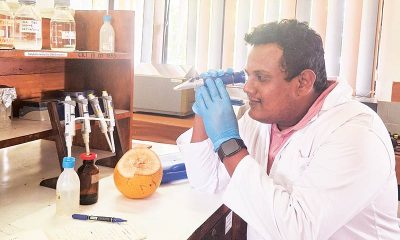
 Life style5 days ago
Life style5 days agoKing of coconuts heads for a golden future
-
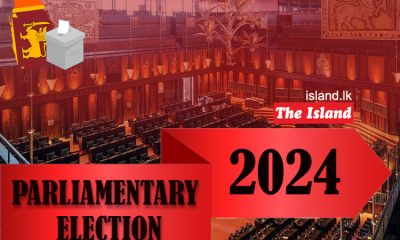
 Latest News6 days ago
Latest News6 days agoColombo district preferential votes announced
-
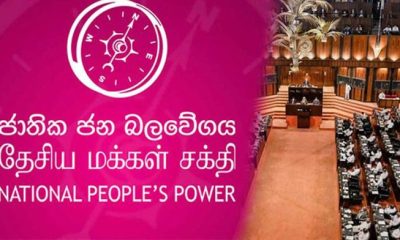
 News4 days ago
News4 days agoNPP appoints two defeated candidates as NL MPs
-
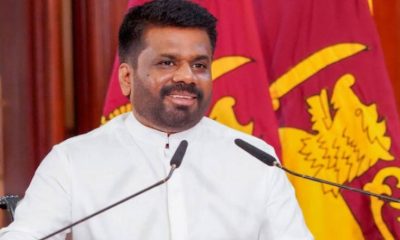
 News6 days ago
News6 days agoPresident warns his party: “We will fail if we view power as an entitlement to do as we please”
-
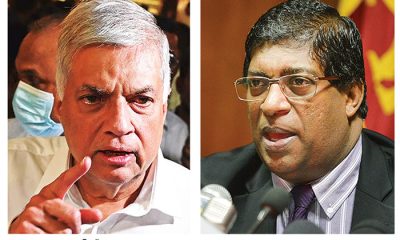
 News3 days ago
News3 days ago‘Gas Cylinder’ explodes; Ranil flays NDF Secy. for submitting Ravi’s name
-
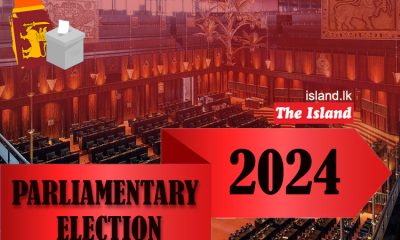
 Latest News6 days ago
Latest News6 days agoGampaha district: NPP 16, SJB 3
-
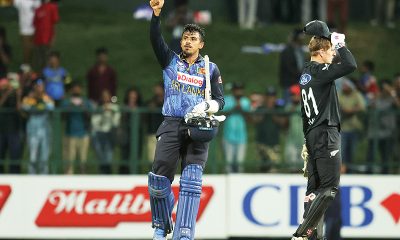
 Sports3 days ago
Sports3 days agoMaking batting compulsory for bowlers has worked – Theekshana
-

 Editorial6 days ago
Editorial6 days ago‘Maroon Wave’ and AKD Magic











